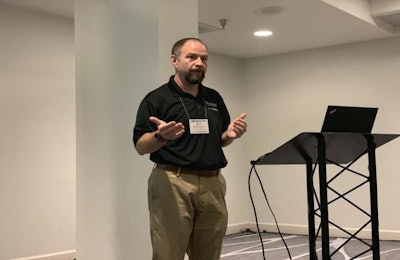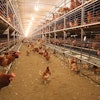
In a WATT Poultry Chat video interview, Darren Karcher, poultry extension specialist at Purdue University, spoke with Egg Industry Insight Managing Editor Deven King about a new virtual educational opportunity that is designed to be a hands-on experience that offers insight on egg quality and food safety for egg farmers and employees.
KING: Darren, it's my understanding that you have created the Shell Egg Academy or known as SEA, which will provide interactive class sessions on a quality and food safety for farmers and egg companies producing and processing table eggs. This is a result of a survey you had a hand in conducting. Can you tell us a little bit about the survey and how Shell Egg Academy came about?
KARCHER: In 2018, in conjunction, Purdue University, United Egg Producers and the Egg Industry Center, along with the United Egg Association conducted a national survey where we were trying to identify the educational needs from an outreach or extension perspective for the table ag industry, as well as the sort of education needs for graduates coming out of animal science and poultry science programs, as well as research then how research findings are being used within the industry and what sort of research do they need to have conducted moving forward. As a result, it became evident that there were lots of opportunities for education within the table egg industry. And so, I pulled together an advisory group in 2019, in the spring, and we came up with this Shell Egg Academy. The idea is we wanted to create a program where we could start to bridge conversations regarding food safety in both the live production side as well as the processing side. The first attempt was in 2019. It went over well. And the industry said, yes, we would like to see it again. We geared up we had it completely sold out in April of 2020, and then COVID hit. So as a result, we've been working in the background and have completely retooled the program. And we will be offering it entirely virtually this year in June. Same sort of concept. Still bridging the live production in the processing with the overarching thing of food safety.
KING: Can you talk a little bit about how SEA will differ from the National Egg Quality School?
KARCHER: The National Egg Quality School is a very established training program, where the focus is on how to really grade those eggs that we are producing with specifications by state and USDA. Were Shell Egg Academy though, on the other hand, is the ability for those wanting training on a quick and dirty understanding of how to do grading of eggs, understanding the management implications and what that may mean for food safety, and then really focusing in the processing plant, and what are those things that we need to be doing to ensure that we have that safe food supply going out the door to the consumer.
KING: Can you give a little insight to what each section might provide attendees and how this will benefit the egg industry?
KARCHER: When I started this process, in talking with my advisory committee, which is made up of people from industry, allied industry and some academics, it became obvious that we really needed to have a program for a few days that was focused on the live production so we can talk about things related to like FDA and swabbing programs or looking at whole genome sequencing, which is being used in traceback and trying to understand more of what's happening in the actual building itself has those hens are producing those eggs. At the same time, there are some common topics that apply both to people in the processing plant as well as those in the live production. And so, we actually have a day or I think in this year as we go virtual we'll have two days where the topics are complimentary, so they will be delivered to people in both sides of the equation. Because we know that what we do over here will directly impact the egg that they see in the processing plant. And then we'll round out the week then by only focusing on the processing side and so really jumping in more detail oriented into the different parts of the machine. How to clean and sanitize. And we're going to give the opportunity for everyone to have some of that egg grading and candling experience. So everybody's aware of what happens during that process of egg production.
KING: Now, it's my understanding that there will be some hands-on activities. Can you talk about how you will conduct those? And what that will look like in a virtual platform?
KARCHER: Yeah, so that's kind of where I think this is exciting. We all know from this past year egnazia, that sitting on a webinar and having people talk to you for 45 minutes to an hour is getting really old. The idea is that we're trying to come up with some interactive ways where the participants will actually have what we're calling a lab in a box, and we will ship that box to each participant. And there will be things for them to get to enjoy an experience as we go throughout the lectures. If we're talking about candling, eggs, they have the ability to sign up, and we will ship them an actual candling light, so that they can use that candling light, they have to supply their own eggs, of course, but they can supply their eggs, they can actually candle them along with the instructor, Jeff Hendricks from USDA. We're also including swabbing materials so we can talk about swabbing and give them the experience then after the class is done to go out and actually swab some of their processing plants or their live production house and then come back the next morning and share those experience with us. What were some of the challenges or what did you notice when you were trying some of these different swamps? So, we're really trying to figure out how to make this an interactive event over the course of the week so that everybody can be entertained and have some fun and recognize that well, it's a really crappy time that we can all be together, we can still have some inventive ways to do education and really try to be there with you as we go through.
This script was edited for length and clarity.

















